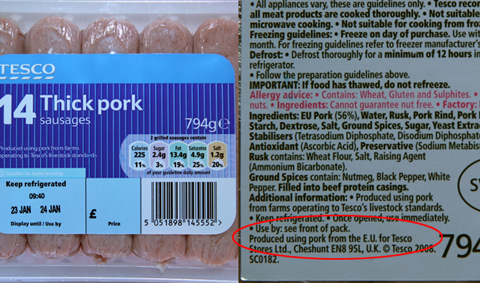Retailers take lead in food labelling origins

New guiding principles on country of origin labelling, announced today formalise measures that Britain’s grocers have already agreed - to provide consumers with clear, accurate information on the origin of their food.
The guidance, titled "Principles on Country of Origin Information", has been developed by retailers’ organisation, the British Retail Consortium (BRC), in association with representatives of food manufacturers, commercial caterers and the hospitality trade. Based on the labelling practices of the best performers in the food chain, it aims to bring others into line to ensure a higher quality and consistency of origin - information everywhere that consumers buy food.
The Principles apply to meat, processed meat products (sausages, bacon, ham etc.) and milk, fresh cream, cheese and butter. They ensure that the term "British" can only be used for meat from animals born and reared in the UK, and dairy products made from milk produced here. Many British grocers already use this approach to origin labelling, with the overwhelming majority committed to going one step further, providing country of origin information on the meat in all "composite" products – such as soups and ready meals.
Food and Farming Minister Jim Paice said: "I’m delighted to see the food industry come together to build on good progress already made in labelling food with the country of its origin. I am pleased that a large number of food companies have already committed to follow the principles agreed today and are encouraging others to also do so. These principles will mean a consistency of information that will reduce confusion and ensure British consumers will be the best informed in Europe."

Andrew Opie, British Retail Consortium Food Director said: "This guidance formalises an approach to country of origin labelling which Britain’s large retailers have already agreed. In fact, many grocers already go well beyond the high minimum standards set out in the document.
"We have taken leadership on this issue because we believe it’s important that all elements of the supply chain, from food processors and restaurants, right through to the catering firms working for Government and councils, give consumers the information they need to make informed decisions. Supermarkets are making it easy for those shoppers who want to buy British to do so. Other food service providers need to up their game."








